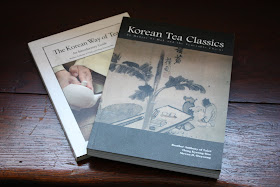
"Regarding taste, sweet and mild are best; if the taste is bitter and astringent, it is bad."
from Cha Sin Jeon- A Chronicle of the Spirit of Tea, a copy of Zhang Poyuan Chalu recorded by Cho Ui, translated in Korea Tea Classics
Those who do not have a copy of Korean Tea Classics do please follow along and participate by referencing a different English translation available here from The Leaf.
This tea classic will be covered one section a week which will go on for 24 weeks. Feel free to jump in with your commentary at anytime.
Peace
from Cha Sin Jeon- A Chronicle of the Spirit of Tea, a copy of Zhang Poyuan Chalu recorded by Cho Ui, translated in Korea Tea Classics
Those who do not have a copy of Korean Tea Classics do please follow along and participate by referencing a different English translation available here from The Leaf.
This tea classic will be covered one section a week which will go on for 24 weeks. Feel free to jump in with your commentary at anytime.
Peace
It seems that Cho-ui considers that fragrances are more important than taste. The section about fragrances is more developed, and so are the previous sections — dealing more with fragrances than actual taste.
ReplyDeleteJulien ELIE,
ReplyDeleteFirst, it must be noted that Cho-Ui was re-writing Zhang Yuan's tea notes. So the core thoughts here are attributed to Zhang Yuan, and he later attributes them to an older tradition of tea.
Although it seems that Zhang Yuan is favouring smell over taste. This is likely not at all the case. We must remember that smells are alot more elusive and harder to describe than tastes. But even so, throughout this work taste and smell (and often colour) appear together. This is the Dao of tea.
Often especially in the spiritual traditions of Asia, less is in fact more. Either way, thanks for alerting us to the mentions of taste vs. smell.
Peace
All,
ReplyDeleteNotes on Section 13- Taste:
It should be noted that taste that is being referred to is actually beyond the concept of taste that most Westerners know as taste. Taste in traditional Asian cultures refers to flavours as they are known here in the West as well as the flavours' therapeutic effect on the body and mind.
This passage is not stating that tea that is sweet and mild tastes the best and bitter and astringent tea tastes bad, but that sweet and mild tea "is best" and bitter and astringent tea "is bad". It can be assumed that sweet and mild tea actually do taste best, of course they do, and that bitter and astringent tea also actually do taste bad. But, and maybe more importantly, it is speaking to the energetic properties of these flavours.
Sweet flavours are strengthening, moistening, they move qi, are yang in nature, and generally are good for digestion. So sweet tea "is best".
Taste is yin and descending, smell is yang and ascending. Taste and smell make up the yin and yang, the Dao of Tea. (see comments in Section- 11 Fragrance: http://mattchasblog.blogspot.com/2011/01/korean-tea-classics-book-club-cha-sin_16.html )
Mild tastes suggest that the tea should not be too yin, too descending in nature. The essence of tea is energetically of the East, green in colour, is yang, and should ascend and disperse. So mild tasting tea "is best".
Bitter flavours are draining, descending, drying, and are yin in nature. These characteristics do not reflect the natural essence of tea which is ascending, strengthening, and yang in nature. So bitter tasting tea "is bad".
Astringent flavours constrict the free flow of qi in the body, they also arrest the movements of fluids in the body. Tea is yang in nature and its qi ascends and disperses. So astringent tasting tea "is bad."
When a tea has too much flavour (relative to smell), is bitter and astringent. It will harm the digestive system, cause discomfort, and consumed frequently, will cause illness.
It should also be noted that sweet and bitter represent yet another dichotomy, the dichotomy of flavour in tea. The Middle Way or a balance should be struck with sweet (yang) taste and bitter (yin) taste if harmony in the cup is to be achieved.
Peace
Many thanks for your comments, Matt.
ReplyDeleteI learnt a lot. Very interesting.